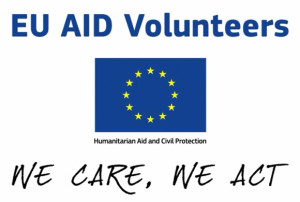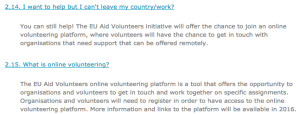 Two years ago, I had the pleasure of being hired to put together the online volunteering strategy for the European Union Aid Volunteers initiative. I provided:
Two years ago, I had the pleasure of being hired to put together the online volunteering strategy for the European Union Aid Volunteers initiative. I provided:
- Background on virtual volunteering – what it means in the EU context, what basic best practices have long been established, etc.
- Details on the infrastructure and capacity that will be needed by host organizations and online volunteers in the EU Aid Volunteers initiative in order to participate, including policies and procedures and how to address issues around confidentiality and safety
- Possibilities for how online volunteering in support of the EU Aid Volunteers initiative might look, in terms of applications, screening, assignment creation, volunteer matching and supporting
- How to integrate returned volunteer alumni networks and peer-to-peer online mentoring into the scheme
- How to evaluate the online volunteering component of the EU Aid Volunteers initiative
- How the contributions of online volunteers might be recognized
- Recruitment of online volunteers to support EU Aid Volunteers and volunteer sending organizations
- How to address potential risks and challenges, like protection of personal data, protection of confidential data of organizations, fear of negative behavior online, lack of understanding of and support for volunteer management among some agencies, labour concerns that can arise with volunteer engagement, and what to call online volunteers that support the EU Aid Volunteer initiative.
What I loved most about this assignment is that it combined both my background in international aid and development and my background regarding volunteer engagement, particularly virtual volunteering. I don’t often get to combine them!
For the last two years, I’ve checked in regularly on the EU Aid Volunteers web page, managed by the EU Humanitarian Aid and Civil Protection department (ECHO), to see how things are coming along with this initiative, particularly with regard to virtual volunteering.
 At long last, I saw this (at left) as part of the FAQ about the initiative on the EU Aid Volunteers web page .
At long last, I saw this (at left) as part of the FAQ about the initiative on the EU Aid Volunteers web page .
Hurrah! I’m thrilled to see this. Virtual volunteering is coming! I don’t know when, and I don’t know exactly what it will look like – I made recommendations, but ECHO is under no obligation to undertake them, of course. But, it’s coming!
I have EU Aid Volunteers in a Google Alert, and I also follow @eu_echo on Twitter, to keep up-to-date on this initiative, in case you are interested in doing so as well.
